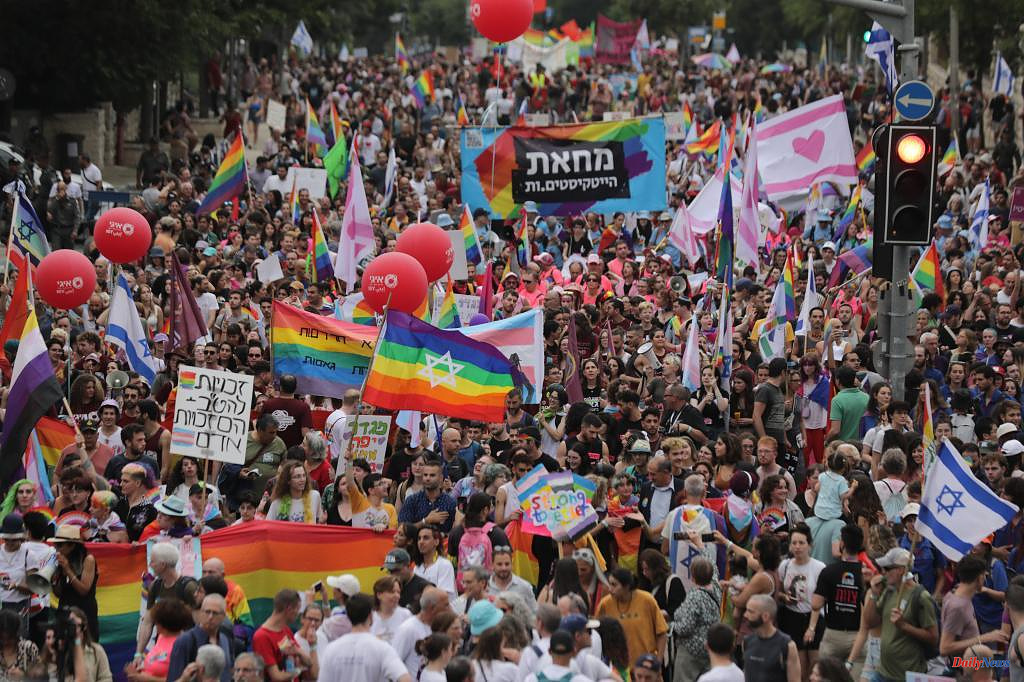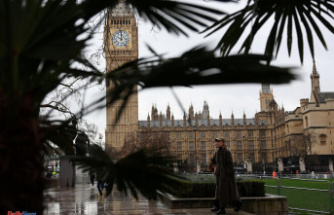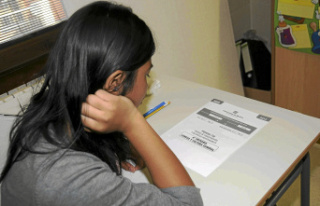Under tight security measures and in a march dominated by rainbows, around 30,000 people participated this Thursday in what is already considered the largest Gay Pride Parade in the history of Jerusalem. Surely, also the most demanding since its first edition in the Holy City in 2002. The especially political nature of the 2023 March is not surprising, taking into account, on the one hand, the deep division in Israel and, on the other, the hostility shown in the past, and in some cases in the present, by various members of the new government towards homosexuals.
"We are not afraid!" sang a group of young people in the demonstration that marked the beginning of the many events of the LGBT community planned this month in Israel. Like every year, the most popular and colorful event will take place next week in Tel Aviv when several hundred thousand people take part in the Pride Parade. It is no coincidence that the most open city in Israel is also the stronghold of the LGBT community. In a Middle East where there are still countries that punish homosexuality with jail and even the death penalty.
Unlike the exuberant and festive parade in Tel Aviv, the march that went through the central streets of Jerusalem was once again characterized by greater restraint. With music and lots of banners but without the dearth of clothing or floats that made the Tel Aviv Boardwalk famous. After all, each parade is adapted to the nature and demographics of the town that hosts it.
Precisely from the coastal city Saar Botzer arrived this Thursday. "This is the first time that I have participated in the Pride Parade in Jerusalem as I believe it is more important than ever due to the hatred and intolerance that comes from certain sectors that have gained strength in the Government in recent months," this Israeli homosexual affirmed to EL MUNDO alluding to the ultra-conservative coalition that came to power five months ago.
Hence, the twenty-first edition of the Pride Parade in Jerusalem was marked by fears in the LGBT community in the face of the fact that Benjamin Netanyahu's coalition includes an openly homophobic deputy (Avi Maoz) and a minister (Itamar Ben Gvir) who in the past he participated in protests against the celebration of the Pride parade in this city.
Today and as Minister of National Security, Ben Gvir arrived at the Police command room that supervised the security device. "Although I have disagreements with this parade, the priority is to guarantee the full safety of its participants. At the same time, we must guarantee freedom of expression and the basic right in democracy such as demonstration and protest, including those against the celebration of the parade. "said Ben Gvir, whose presence in a nearby room provoked the ire of some March participants. Not far from the protest of several dozen Jews called by the extremist organization Lehava, a couple of American tourists walked warning of the "sin of homosexuality." "Christ cannot accept them like this," they told us.
After the November elections and given the center-left's refusal to agree with Netanyahu due to his corruption trial, the Likud leader desperately threw himself into the arms of the ultranationalists and Ben Gvir and Bezalel Smotrish to join the two ultra-Orthodox parties and so return to power. On the other side of the coin in this field, Netanyahu promises that the rights of the collective will be fully respected and guaranteed while one of the Likud leaders, Amir Ohana, is the first declared homosexual to preside over the Parliament in Israel. Her husband and two of her sons witnessed the investiture in the Jerusalem chamber, being quoted in her speech.
The head of the association for the rights of LGBT in the Knesset, Yorai Lahav Hertzanu, explains the change: "In the previous years, we fought to achieve progress and today to prevent it from being taken away from us." "We are here in Jerusalem and throughout Israel to form a solid barrier against the fear and hatred that this government spreads," he added to this newspaper before the leader of his centrist party and former prime minister Yair Lapid was applauded as speaker of the act in a well-known city park.
Some 2,000 policemen were in charge of guaranteeing the security of the day in the always tense city. In the security preparations, he was present at what happened in 2015 when the fanatic Yishai Shlissel broke into the tour and stabbed the teenager Shira Banki (15) who had come to support her friends from her LGTB community. Her murder, whose perpetrator was sentenced to life in prison, sparked widespread condemnation in Israel. Since then, the accesses to the tour have been fenced off and monitored by the agents who register each participant. Hours before the start, the Israeli police arrested three people for sending hate messages and inciting violence on social media. Late at night, several youths attacked a person carrying an LGBT flag near the central train station in Jerusalem.
The Islamist group Hamas, for its part, attacked Israel for holding the Pride Parade, saying that "Palestinians must defend the Arab and Muslim character of Jerusalem."
The liberal awakening in Israel, reflected in the massive demonstrations against the plan - frozen for two months - of the Government to make profound changes in the judicial establishment giving more power to the executive, has contributed to the fact that this year the parade was more successful. No one forgets that the Supreme Court has been fundamental in advancing the rights of a community that, on the other hand, has more support in the religious sector. One of them, the left-wing activist Yaya Fink, tells us, wearing a kippah, that "there are more and more religious moderates who accept coming out. Many of them even participate in the Gay Pride Parade." Still, he admits, there's still a long way to go.
According to the criteria of The Trust Project












